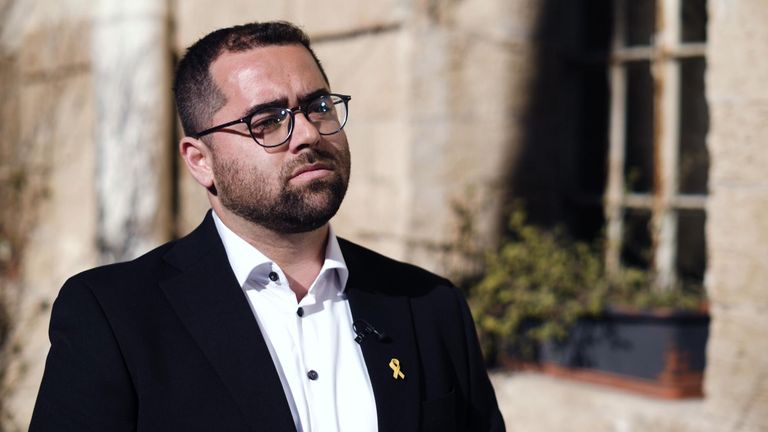This video can not be played
To play this video you need to enable JavaScript in your browser.
President Joe Biden delivered a fiery State of the Union address on Thursday, taking repeated swipes at Donald Trump and covering the broad themes of his re-election campaign.
Mr Biden used the term "my predecessor" to refer to Mr Trump 13 times in a speech that lasted more than an hour.
He accused his likely election opponent of "bowing down" to Russia and criticised him over the Capitol riot.
Mr Biden also covered immigration, abortion, the economy and Gaza.
The atmosphere in the House chamber was raucous at times, with loud cheering from Democrats and heckling from some Republicans.
It was a spectacle more typical of a political convention than a State of Union address - a constitutionally mandated report that is usually heavy on pageantry and policy.
But this is an election year and the stakes for Mr Biden were high. He was feisty and confrontational as he sought to draw the battle lines for his nascent campaign.
Taking aim at Trump
Unsurprisingly, many of his barbs were aimed at Mr Trump given he is almost certain to be his opponent in November's general election.
"My predecessor failed the most basic duty any president owes the American people - the duty to care," he said in reference to Mr Trump's handling of the Covid pandemic. "That is unforgivable."
He criticised Mr Trump for his recent comments about Russia and Nato, and said that he sought to "bury the truth" about the 6 January 2021 attack on the US Capitol.
He blamed him for the Supreme Court decision to overturn the Roe v Wade ruling which guaranteed abortion rights and for blocking bipartisan immigration reforms.
Mr Trump, meanwhile, had promised to react in real time to the speech on his Truth Social platform. "Biden is on the run from his record and lying like crazy to try to escape accountability for the horrific devastation he and his party have created," he wrote.
"They continue the very policies that are causing this horror show to go," he said.
This video can not be played
To play this video you need to enable JavaScript in your browser.
Mr Biden aggressive approach on Thursday may have been born, at least in part, out of necessity. At 81, he is the oldest president in US history and has been beset by questions about his age and mental acuity.
His approval ratings are the lowest of any modern president seeking re-election. He is in a statistical dead heat with Mr Trump, however, who also is viewed negatively by voters.
Even when Mr Biden addressed his age, he did so with a jab at Mr Trump, who at 77 is only a few years younger than him.
"I know it may not look like it, but I've been around for a while," he said. After rattling off a list of positive attributes he said defined America, he added a kicker.
"Some other people my age see a different story: an American story of resentment, revenge and retribution."
A punchy exchange on immigration
Mr Biden regularly ad-libbed responses to what was at times a hostile audience on the Republican side of the chamber. He quipped, parried and expressed mock surprise at their outbursts.
When the topic turned to immigration, a subject of political vulnerability for the president, he was once again ready to engage. But here, he stumbled.
After Republican Congresswoman Marjorie Taylor Greene accused him of ignoring the murder of Georgia nursing student Laken Riley, allegedly by an undocumented Venezuelan immigrant, Mr Biden held up a button with her name on it - one Ms Greene had given him as he walked in.
This video can not be played
To play this video you need to enable JavaScript in your browser.
After seemingly mispronouncing her name as "Lincoln" Riley, he said she was murdered by an "illegal" - a term criticised by immigrant-rights groups.
Mr Biden went on to call for Republicans to support the bipartisan immigration legislation passed by the Senate and accused Mr Trump of "playing politics" by opposing the bill for electoral gain. The damage, however, may have been done.
A sales pitch for November
When Mr Biden wasn't throwing haymakers at his opponent, he sought to highlight what he characterised as a record of accomplishment during his first term and outline a sales pitch for his re-election.
"I inherited an economy that was on the brink," he said, "and now our economy is the envy of the world."
Figures on the American economy have been trending up for months now. The public perception of the economy, however, has been much darker.
Mr Biden nodded at this split, calling the US economic revival "the greatest story never told".
Whether the president's words will be enough to change minds, however, remains to be seen.
It was a speech geared toward the American middle class - the voters of moderate means who make up the bulk of the electorate.
It included a variety of new proposals, most of which would require congressional legislation to enact - an unlikely scenario unless Democrats retake the House of Representatives in November.
He pitched a tax credit for new home buyers, who have seen their purchasing power eroded by higher mortgage rates. He also called for expanding a cap on prescription drug spending to every American who has health insurance and raising taxes on corporations.
Walking the line on Gaza
Mr Biden opened his speech with a call for military aid to Ukraine, but the bulk of his discussion of foreign policy came towards the end when he turned his attention to the Middle East.
The Gaza war has divided Democrats, with a vocal portion of the president's liberal flank calling for the US to use every means at its disposal to push for a ceasefire. Some took to the Washington streets on Thursday evening in an unsuccessful attempt to block the president's motorcade from reaching the Capitol.
Mr Biden said his administration was working towards a ceasefire that would last "at least 6 weeks," and he detailed a new plan - announced earlier in the day - for the US to construct a temporary seaport in Gaza to allow humanitarian aid to enter by ship.
He had some harsh words for Israel, calling the civilian casualties in Gaza "heartbreaking" and saying it had a "fundamental responsibility" to protect innocent lives.
Mr Biden's speech, because it was delivered without any significant stumbles or gaffes, is a hurdle cleared for the president - and its content could serve as a guide to how his campaign plans to sell the American public on another four years of Democratic governance.
At the very least, it will probably convince nervous Democrats that their presumptive nominee is ready to go toe-to-toe with his Republican opponent in November.

More on the US election
- Explained: A simple guide to the US 2024 election
- Analysis: Where Biden v Trump will be won and lost
- Policies: What a Trump second term would look like
- Economy: Voters feel better - will that help Biden?
- Recap: The Trump life story to date

https://news.google.com/rss/articles/CBMiM2h0dHBzOi8vd3d3LmJiYy5jby51ay9uZXdzL3dvcmxkLXVzLWNhbmFkYS02ODQ3MjMwOdIBN2h0dHBzOi8vd3d3LmJiYy5jby51ay9uZXdzL3dvcmxkLXVzLWNhbmFkYS02ODQ3MjMwOS5hbXA?oc=5
2024-03-08 05:21:56Z
CBMiM2h0dHBzOi8vd3d3LmJiYy5jby51ay9uZXdzL3dvcmxkLXVzLWNhbmFkYS02ODQ3MjMwOdIBN2h0dHBzOi8vd3d3LmJiYy5jby51ay9uZXdzL3dvcmxkLXVzLWNhbmFkYS02ODQ3MjMwOS5hbXA









